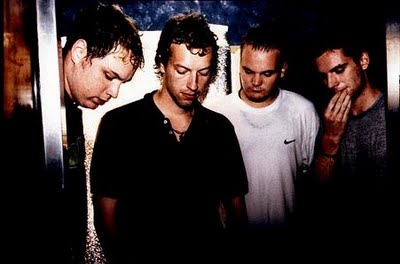1) Don’t Panic; 2) Shiver; 3) Spies; 4) Sparks; 5) Yellow; 6) Trouble; 7) Parachutes; 8) High Speed; 9) We Never Change; 10) Everything’s Not Lost / Life Is for Living [hidden track]
Melancholy and subdued, a real case of a humble origin story for a big bang later on. Definitely underrated.
Key tracks: "Don't Panic", "Spies", "Trouble"
Who’d have thought that a whisper like this would end up launching one of the most extroverted, anthemic superstar groups on the planet?
At this point I think it’s safe to assume that no one comes to Coldplay through their debut album: their global star power has long since overshadowed their beginning and the band are so quiet about it themselves that Parachutes has been all but brushed from history, bar the still-sort-of-ubiquitous “Yellow”. Thing is, through some quirk of the universe things could have gone in a wholly different direction. Parachutes isn’t an old shame or the embarrassing first steps: it not only had commercial success when it came out but also high critical acclaim, with a great deal of buzz and excitement surrounding its release that actually translated to genuine success. It could just as easily have become another classic debut that the band would forever try to live up to, or another victim of contemporary trends as the only real mark they left in the world before vanishing like so many of their then-counterparts. Not only did Coldplay managed to break both curses, but it’s pretty telling of their success since that they’ve gone through so many hits they can easily ignore the ones got them through the door in the first place.
Parachutes‘ most interesting facet is that it’s absolutely nothing like a Coldplay album. The band have become synonymous with giant stadiums, grand audience sing-alongs and all-encompassing anthems: Parachutes, however, is bedroom-sized and somber, and its muted, dark colours clash ridiculously with the technicolour rainbows the band ride on now. The post-OK Computer Britain in the early 00s was a hotbed for melancholy, acoustic-heavy pop/rock albums and Coldplay slotted among that trend very comfortably. Only the amplified “Shiver” and “Yellow” kick the gear up a notch and raise the volume, and “Everything’s Not Lost” is the prototype for their epic torchlight shenanigans, though to a much more downstated, downright shy degree. Mostly Parachutes simply wallows, with Martin’s gentle piano and Buckland’s soft strumming and minimal melodies guiding the band through various degrees of melancholy and mid-tempo floating. It’s an album largely made out of ballads and mood pieces; melancholy, but in a quietly comfortable way rather than depressing.

But while Parachutes is well-written for the most part, it does carry the tell-tale feel that it’s the work of a young band who found one thing that works and kept on doing it repeatedly (something the stories about the band’s performance being a little shambles at the time back up - the slow tempos are apparently partly the result of intentionally making the songs easier to play together as a band). That said, the certain homeliness does have its perks. For one, you could never imagine the group ever being able to knock out something as low-key and effortless as “Don’t Panic” in their current form. It’s a (over)short and simple song but so incredibly lovely in such an instant way, and much of its power comes from how completely nonchalant and minor it sounds, Martin mumbling his way through the shuffling verses and the deceivingly direct chorus melody. “Trouble” similarly keeps itself calm and is all the better for it - stadium-Coldplay would have it be full of bombast, but now its sheepishly exploding little sweep of a chorus highlights the song’s overall quality arrangement and melody. Similar moments occur throughout, and it’s clear already that there is a big pop band growing quietly inside, but right now they’re too shy to come out of a still-young band. “Yellow” is the obvious exception and it’s actually the strangeling of the album - after all these years I’m still not sure if it’s a bit too obvious and a little too airheaded to be genuinely enjoyable, or if the sudden moment of melodic inspiration it discovers during its stealth chorus is strong enough to make it a real keeper.
Indeed, Parachutes is at its best when it stays away from the loud and boisterous hooks and sinks into its warm, home-spun sound. It’s got an intimacy that the band’s never really been able to reach since and when it’s being emphasised – whether it’s the simple beauty of “Don’t Panic”, the atmospheric dwelling of “Spies” or the sadsack daydreaming of “Sparks” and “We Never Change” - the album threatens to become something special. It never quite does to any major extent, staying comfortably good throughout but rarely breaking out further, but its humble intimacy does lend it a little extra staying power when placed in a line with the albums that followed since. That alone neither makes it worth brushing off completely or praising highly, but it’s a pleasant and actually rather good listen that’s maybe getting a little too neglected – both by the band and the audience.

No comments:
Post a Comment